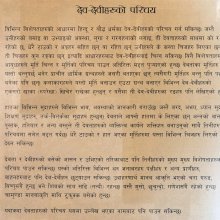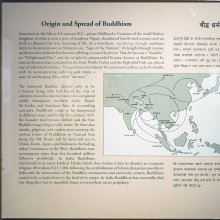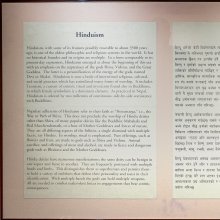Paricaya: 18 definitions
Introduction:
Paricaya means something in Buddhism, Pali, Hinduism, Sanskrit, Marathi, Hindi. If you want to know the exact meaning, history, etymology or English translation of this term then check out the descriptions on this page. Add your comment or reference to a book if you want to contribute to this summary article.
Alternative spellings of this word include Parichaya.
Images (photo gallery)
In Hinduism
Yoga (school of philosophy)
Source: Brill: Śaivism and the Tantric Traditions (yoga)Paricaya (परिचय) refers to one of the four “states” or “stages” of yoga practice, according to the Amṛtasiddhi, a 12th-century text belonging to the Haṭhayoga textual tradition.—The four avasthās, “states” or “stages” of yoga practice (ārambha, ghaṭa, paricaya, niṣpanna/niṣpatti) introduced in the Amṛtasiddhi (vivekas 19–33), are taught in many Sanskrit Haṭhayoga texts; they are also mentioned in the old Hindi Gorakhbāṇī (śabds 136–139).

Yoga is originally considered a branch of Hindu philosophy (astika), but both ancient and modern Yoga combine the physical, mental and spiritual. Yoga teaches various physical techniques also known as āsanas (postures), used for various purposes (eg., meditation, contemplation, relaxation).
Sports, Arts and Entertainment (wordly enjoyments)
Source: archive.org: Syainika Sastra of Rudradeva with English Translation (art)Paricaya (परिचय) refers to “inspiring (the hawk) with confidence” (in order to get acquinted with the trainer), according to the Śyainika-śāstra: a Sanskrit treatise dealing with the divisions and benefits of Hunting and Hawking, written by Rājā Rudradeva (or Candradeva) in possibly the 13th century.—Accordingly, [while discussing the training of hawks]: “[...] Then every night, in the dim light of lamps, the eyes should be opened, and washed with cool and fair water. The hawk should be gradually inspired with confidence (paricaya) [kiṃcit paricayaṃ kārayet] and made to hear the falconer’s voice. [...]”.

This section covers the skills and profiencies of the Kalas (“performing arts”) and Shastras (“sciences”) involving ancient Indian traditions of sports, games, arts, entertainment, love-making and other means of wordly enjoyments. Traditionally these topics were dealt with in Sanskrit treatises explaing the philosophy and the justification of enjoying the pleasures of the senses.
In Buddhism
Mahayana (major branch of Buddhism)
Source: WikiPedia: Mahayana BuddhismParicaya (परिचय) or Paricayabala (Tibetan: yong-su ’dris-pa) refers to the “power of familiarity” representing one of the six Bala (“powers”) connected with śamatha (“access concentration”), according to Kamalaśīla and the Śrāvakabhūmi section of the Yogācārabhūmi-śāstra.

Mahayana (महायान, mahāyāna) is a major branch of Buddhism focusing on the path of a Bodhisattva (spiritual aspirants/ enlightened beings). Extant literature is vast and primarely composed in the Sanskrit language. There are many sūtras of which some of the earliest are the various Prajñāpāramitā sūtras.
Languages of India and abroad
Pali-English dictionary
Source: BuddhaSasana: Concise Pali-English Dictionaryparicaya : (m.) practice; familiarity; acquaintance.
Source: Sutta: The Pali Text Society's Pali-English DictionaryParicaya, (fr. pari+ci) familiarity, acquaintance J. VI, 337; Vism. 153; PvA. 74.—adj. (-°) acquainted with, versed in (Loc.) J. II, 249 (jāta°), VvA. 24 (kata°); PvA. 4 (id.), 129 (id.). (Page 424)

Pali is the language of the Tipiṭaka, which is the sacred canon of Theravāda Buddhism and contains much of the Buddha’s speech. Closeley related to Sanskrit, both languages are used interchangeably between religions.
Marathi-English dictionary
Source: DDSA: The Molesworth Marathi and English Dictionaryparicaya (परिचय).—m (S) Acquaintance, intimacy, familiar intercourse, conversancy (with persons, business, subjects or branches of knowledge). 2 (Mistaken for pratyaya) Experience or experimental knowledge. v ghē, pāha, yē, utara. See explication under pratīti.
Source: DDSA: The Aryabhusan school dictionary, Marathi-Englishparicaya (परिचय).—m Acquaintance, intimacy.
Marathi is an Indo-European language having over 70 million native speakers people in (predominantly) Maharashtra India. Marathi, like many other Indo-Aryan languages, evolved from early forms of Prakrit, which itself is a subset of Sanskrit, one of the most ancient languages of the world.
Sanskrit dictionary
Source: DDSA: The practical Sanskrit-English dictionaryParicaya (परिचय).—
1) Heaping up, accumulation.
2) Acquaintance; familiarity, intimacy; पुरुषपरिचयेन (puruṣaparicayena) Mṛcchakaṭika 1.56; अतिपरिचयादवज्ञा (atiparicayādavajñā) 'familiarity breeds contempt'; परिचयं चललक्ष्यनिपातने (paricayaṃ calalakṣyanipātane) R.9.49; सकलकलापरिचयः (sakalakalāparicayaḥ) K.76.
3) Trial, study, practice, frequent repetition; हेतुः परिचयेस्थैर्ये वक्तुर्गुणनिकैव सा (hetuḥ paricayesthairye vakturguṇanikaiva sā) Śiśupālavadha 2.75;11.5; वर्णपरिचयं करोति (varṇaparicayaṃ karoti) Ś.5.
4) Recognition; Meghadūta 9.
5) Stay; चिरं मातुलपरिचयादविज्ञात- वृत्तान्तोऽस्मि (ciraṃ mātulaparicayādavijñāta- vṛttānto'smi) Pratimā 3.
Derivable forms: paricayaḥ (परिचयः).
Source: Cologne Digital Sanskrit Dictionaries: Shabda-Sagara Sanskrit-English DictionaryParicaya (परिचय).—m.
(-yaḥ) 1. Acquaintance, intimacy. 2. Accumulation. 3. Meeting with a friend. 4. Study, Practice. 5. Recognition. E. pari about, ci to gather, aff. ac.
--- OR ---
Paricāya (परिचाय) or Paricāyya.—m.
(-yaḥ) 1. A place for preparing or holding a sacrificial fire. 2. Sacrificial fire in general. 3. Raising the rent or revenue of land. E. pari worship, &c. ci to collect, aff. ṇyat, form specific.
Source: Cologne Digital Sanskrit Dictionaries: Benfey Sanskrit-English DictionaryParicaya (परिचय).—i. e. pari-ci + a, m. 1. Knowledge, [Suśruta] 1, 28, 17. 2. Trial, [Śākuntala, (ed. Böhtlingk.)] 59, 4 ([Prakrit]). 3. Acquaintance, familiarity, [Kathāsaritsāgara, (ed. Brockhaus.)] 9, 9. 4. Accumulation.
Source: Cologne Digital Sanskrit Dictionaries: Cappeller Sanskrit-English DictionaryParicaya (परिचय).—1. [masculine] heaping up, accumulation.
--- OR ---
Paricaya (परिचय).—2. [masculine] knowledge, acquaintance, familiarity or intercourse with ([genetive], [locative], [instrumental] ±samam, or —°).
Source: Cologne Digital Sanskrit Dictionaries: Monier-Williams Sanskrit-English Dictionary1) Paricaya (परिचय):—[=pari-caya] a etc. See under pari- √1. 2. ci.
2) [=pari-caya] [from pari-ci] b m. heaping up, accumulation, [Kauśika-sūtra]
3) [=pari-caya] [from pari-ci] c m. acquaintance, intimacy, familiarity with, knowledge of ([genitive case] [locative case] [instrumental case] with or sc. samam, or [compound]), [Mahābhārata; Kāvya literature] etc.
4) [v.s. ...] trial, practice, frequent repetition, [Kāvya literature] (cf. rati-p)
5) [v.s. ...] meeting with a friend, [Horace H. Wilson]
Source: Cologne Digital Sanskrit Dictionaries: Yates Sanskrit-English Dictionary1) Paricaya (परिचय):—[pari-caya] (yaḥ) 1. m. Acquaintance; meeting a friend; accumulation.
2) Paricāya (परिचाय):—[pari-cāya] (yyaḥ) 1. m. Sacrificial fire; its place; raising the rent of land.
Source: DDSA: Paia-sadda-mahannavo; a comprehensive Prakrit Hindi dictionary (S)Paricaya (परिचय) in the Sanskrit language is related to the Prakrit word: Pārayaya.
[Sanskrit to German]
Sanskrit, also spelled संस्कृतम् (saṃskṛtam), is an ancient language of India commonly seen as the grandmother of the Indo-European language family (even English!). Closely allied with Prakrit and Pali, Sanskrit is more exhaustive in both grammar and terms and has the most extensive collection of literature in the world, greatly surpassing its sister-languages Greek and Latin.
Hindi dictionary
Source: DDSA: A practical Hindi-English dictionaryParicaya (परिचय) [Also spelled parichay]:—(nm) introduction; acquaintance, familiarity; -[paṃkti] a legend; -[patra] a letter of introduction; —[karanā/denā] to introduce; to familiarize.
...
Kannada-English dictionary
Source: Alar: Kannada-English corpusParicaya (ಪರಿಚಯ):—
1) [noun] the state of being acquainted (with someone) or the relation resulting from it; acquaintance.
2) [noun] the state or fact of being intimate; intimate association; familiarity; intimacy.
3) [noun] the act or process of applying the mind so as to acquire knowledge or understanding, as by reading, investigating, etc.; a study.
4) [noun] ಪರಿಚಯವಾಗು [paricayavagu] paricayavāgu to be acquainted; to be introduced to; ಪರಿಚಯ ಹತ್ತು [paricaya hattu] paricaya hattu to recall another’s acquaintenance (when met again); ಪರಿಚಯ ಮಾಡಿಕೊಡು [paricaya madikodu] paricaya māḍikoḍu to introduce ( a person or thing) to another; ಪರಿಚಯ ಮಾಡಿಕೊಳ್ಳು [paricaya madikollu] paricaya māḍikoḷḷu to get introduced to another; to become acquainted with.
Kannada is a Dravidian language (as opposed to the Indo-European language family) mainly spoken in the southwestern region of India.
See also (Relevant definitions)
Starts with: Paricaya-pati, Paricayabala, Paricayaka, Paricayaka-cihna, Paricayakaruna, Paricayambade, Paricayaniya, Paricayapatra, Paricayapatta, Paricayastha, Paricayasthe, Paricayatmaka, Paricayatmika, Paricayavant, Paricayavastha, Paricayavat.
Ends with: Anahutaparicaya, Aparicaya, Atiparicaya, Atmaparicaya, Chandahparicaya, Citraparicaya, Indrajalaparicaya, Kataparicaya, Mukhaparicaya, Nitparicaya, Ratiparicaya, Varnaparicaya.
Full-text (+15): Varnaparicaya, Paricayavat, Paricayavant, Paricayavastha, Pariciti, Anavagita, Nitparicaya, Namna, Parayaya, Ratiparicaya, Indrajalaparicaya, Avarana, Atmapratiti, Avran, Paricayya, Devi, Potim, Parijayati, Parichay, Paricayakaruna.
Relevant text
Search found 19 books and stories containing Paricaya, Paricāya, Pari-caya, Pari-cāya; (plurals include: Paricayas, Paricāyas, cayas, cāyas). You can also click to the full overview containing English textual excerpts. Below are direct links for the most relevant articles:
Bhajana-Rahasya (by Srila Bhaktivinoda Thakura Mahasaya)
Text 18 < [Chapter 7 - Saptama-yāma-sādhana (Pradoṣa-kālīya-bhajana–vipralambha-prema)]
Text 10 < [Chapter 5 - Pañcama-yāma-sādhana (Aparāhna-kālīya-bhajana–kṛṣṇa-āsakti)]
Bhakti-rasamrta-sindhu (by Śrīla Rūpa Gosvāmī)
Verse 3.2.20 < [Part 2 - Affection and Service (dāsya-rasa)]
Verse 3.3.127 < [Part 3 - Fraternal Devotion (sakhya-rasa)]
Verse 2.1.202 < [Part 1 - Ecstatic Excitants (vibhāva)]
Chaitanya Bhagavata (by Bhumipati Dāsa)
Verse 2.4.63 < [Chapter 4 - Revelation of Nityānanda’s Glories]
Verse 2.3.149 < [Chapter 3 - The Lord Manifests His Varāha Form in the House of Murāri and Meets with Nityānanda]
Verse 1.1.171 < [Chapter 1 - Summary of Lord Gaura’s Pastimes]
Maha Prajnaparamita Sastra (by Gelongma Karma Migme Chödrön)
Note (3): The Eleven Knowledges in the Mahāyāna < [Part 1 - The eleven knowledges (jñāna, ñāṇa)]
Atharvaveda and Charaka Samhita (by Laxmi Maji)
Bhāvamiśra (Āyurveda scholar) < [Chapter 1 - Introduction]
Rasendrasāra Saṅgraha (Āyurveda book) < [Chapter 1 - Introduction]
Aims of the present work < [Chapter 1 - Introduction]
Sahitya-kaumudi by Baladeva Vidyabhushana (by Gaurapada Dāsa)
Text 10.195 < [Chapter 10 - Ornaments of Meaning]


